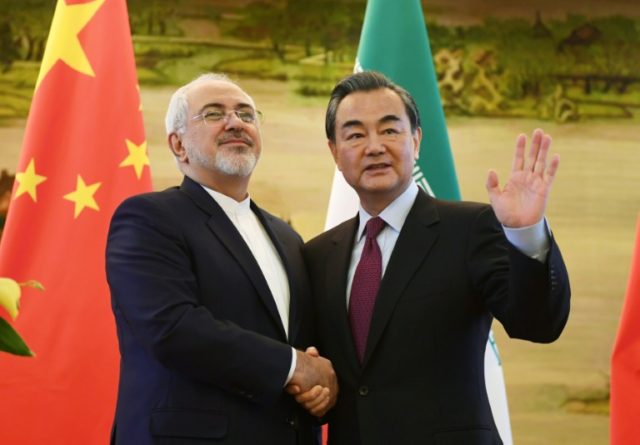Chinese Foreign Minister Wang Yi welcomed his Iranian counterpart Mohammad Javad Zarif to Beijing on Tuesday, stressing the importance of China’s relationship with Iran and telling Zarif he became a “famous person” in China with his speech at the Munich Security Conference on Sunday.
“Yesterday evening I saw on TV how you defended the rights of Iran loud and clear at the Munich Security Conference. I think an audience of hundreds of millions of Chinese also watched what you said and you are a famous person now,” Wang gushed to Zarif.
Wang told reporters he relished the opportunity to “have this in-depth strategic communication with my old friend to deepen the strategic trust between our two countries and to ensure fresh progress of the bilateral comprehensive and strategic partnership.”
“We consider the comprehensive strategic partnership between Iran and China as one of our most important relations,” Zarif responded.
China walks a fine diplomatic line in the Middle East, as it naturally gravitates to anti-American powers like Iran but also wishes to maintain functional relationships with U.S. allies such as Saudi Arabia and Israel.
Saudi Crown Prince Mohammed bin Salman is scheduled to visit China from Wednesday through Friday of this week, meeting with top officials including Communist Party leader Xi Jinping. China is the single largest customer for Saudi crude oil and could be very helpful to bin Salman’s plan to diversify the Saudi economy. Saudi Arabia, in turn, could be vital to China’s plan to extend its Belt and Road infrastructure program into the Middle East.
Beijing saw an opportunity to forge deeper political ties with Riyadh after Western powers ostracized the Saudis over the murder of Jamal Khashoggi in October. China has refrained from criticizing the Saudis for Khashoggi’s death, while the Saudis – designated guardians of the Islamic holy cities of Mecca and Medina – have not spoken up against China’s persecution of the Uighur Muslims, not even when reports from the Uighur re-education camps indicated China is attacking Islam itself.
The Saudis view Iran as their regional arch-enemy and will not be pleased with Beijing’s effort to cozy up with Iran. China’s relationship with Israel may likewise be tested by Foreign Minister Wang Yi’s gushing praise for Zarif’s Munich speech, which accused Israel of violating international law and seeking to provoke a war with Iran.
In addition to its financial interests in Iran, China has a geopolitical interest in weakening sanctions as an instrument of U.S. foreign policy.
Xi Jinping met on Wednesday with Iranian parliament speaker Ali Larjani, who traveled to Beijing with Foreign Minister Zarif. Xi said Iran has China’s support to play a greater “constructive role” in Middle Eastern security.
Xi said he wishes to develop “comprehensive strategic ties” with Iran, while Larjani hailed China as “one of Iran’s reliable partners.”
“No country can damage Iran-China relations,” Larjani declared.
Chinese officials have been evasive about how far Beijing will go to help Tehran evade U.S. sanctions, although they have expressed clear disapproval for President Donald Trump’s decision to withdraw from the nuclear deal arranged by his predecessor Barack Obama.
“We have always opposed unilateral sanctions and long-arm jurisdiction,” Chinese Foreign Ministry spokesman Geng Shuang said on Tuesday, putting China’s support for the nuclear deal in the context of its desire to weaken U.S. sanctions overall.

COMMENTS
Please let us know if you're having issues with commenting.